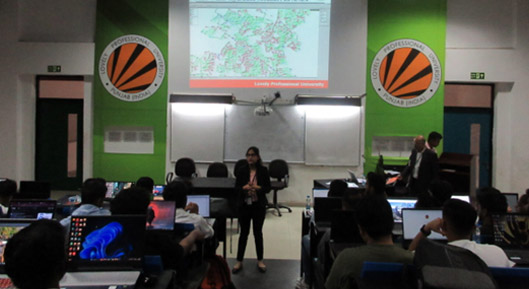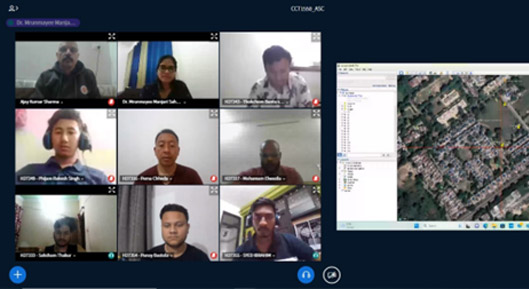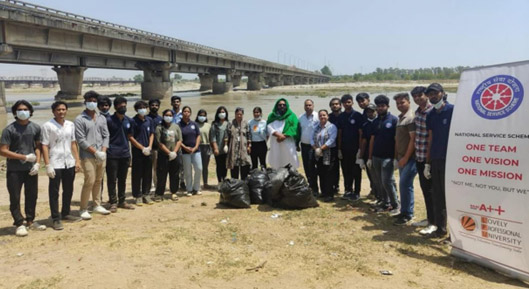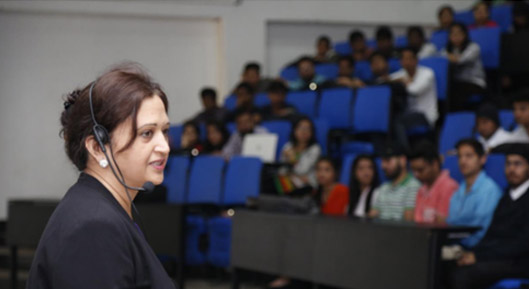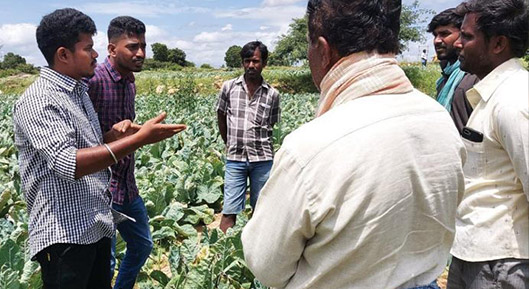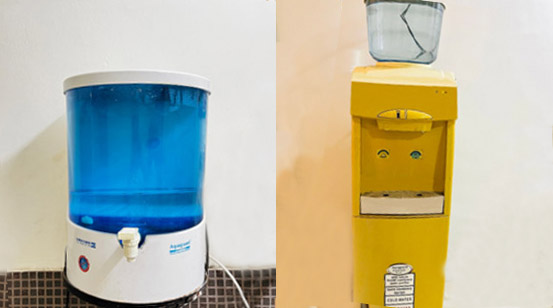
LPU ensures safe drinking water through two primary sources: portable UV purifier water tanks with drinking water taps and purified water dispensers. The water tanks are connected to the main water system, equipped with a 5-micron filter and UV light disinfection to ensure bacteria- and virus-free water. The Central Maintenance Management oversees regular maintenance, including filter replacements, UV light checks, and cleaning schedules. Additionally, the department coordinates with compliant outsourced providers for purified water dispensers. LPU’s initiatives align with SDG 6 (Clean Water and Sanitation) by ensuring clean water availability, supporting health and wellbeing. The university also employs water-saving technologies, such as automatic sensor-based urinals, push-button taps, dual-flush systems, and spray jet nozzles, contributing to sustainable water management. Through continuous monitoring and innovation, LPU provides safe drinking water for students, staff, and visitors while minimizing water wastage.
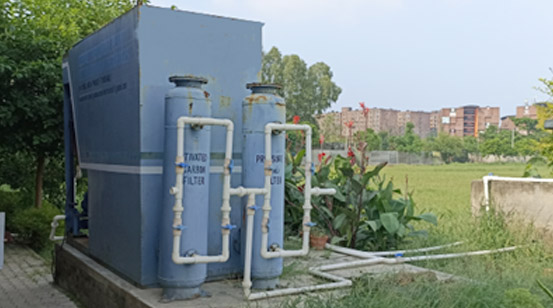
LPU implements comprehensive and ongoing efforts to ensure adequate water facilities across campus. All academic blocks are equipped with water coolers featuring advanced RO systems, which are regularly serviced and cleaned by the administrative teams of each block. The university conducts monthly microbial tests to verify water quality, strictly following the Indian National Standards for Drinking Water (INSDW). LPU’s initiative to bridge gaps between existing water facilities and user needs in certain blocks further demonstrates its commitment to providing safe and accessible drinking water. By continuously upgrading its infrastructure and adhering to rigorous safety standards, LPU fosters a healthy, sustainable environment for students, staff, and visitors. These efforts underline the university’s dedication to sustainable water management, aligning with both national and international standards for water quality. The university has established three Sewage Treatment Plants (STPs) to treat wastewater generated on campus, with a main 5 MLD (50 lakh liters) STP, enhancing sanitation and environmental sustainability.
Academic Initiatives:
In addition to its in-campus initiatives, LPU adopts a comprehensive approach through its academic programs. The university offers specialized courses for undergraduate students in the School of Civil Engineering, School of Agriculture, and School of Architecture and Design. These courses focus on key aspects of water quality, including distribution systems, water properties, water quality standards, wastewater collection, and treatment technologies. LPU actively promotes research in various subfields such as water conservation, treatment methods, sustainable water management, and policy development. By fostering collaboration among experts from different disciplines, the university encourages the creation of innovative solutions to tackle critical water challenges. LPU’s research priorities include areas like water management, human dimensions of water, urban water systems, ecological restoration, agricultural water use, and the intersection of water and energy, contributing to both academic advancement and practical progress in water sustainability.
The university recognizes the urgent need for sustainable on-farm solutions to help agricultural producers conserve groundwater by safely utilizing nontraditional irrigation water sources. Through its CONSERVE agenda, "Coordinating Non-Traditional Sustainable Water Use in Variable Climates," the university is driving the adoption of innovative practices to address agricultural water challenges intensified by climate change.
Click Here
Framework And Guidelines
Guidelines on water use, reuse and its discharge in campus
LPU has implemented a comprehensive policy to manage and conserve water resources on campus, aligning with Sustainable Development Goal 6 (SDG 6) for clean water and sanitation. Certified water harvesting bores and strict adherence to the National Building Code of India (NBC-2016) ensure water use efficiency. LPU is authorized by the Central Ground Water Board (CGWB) to extract up to 4600 cubic meters of water daily, sufficient for its population of over 50,000. The campus water consumption rate of 62 liters per person is significantly lower than the NBC standard of 135 liters per person. LPU emphasizes the reusability of water resources through processes like drip irrigation and operates three Sewage Treatment Plants (STPs), with treated water reused for landscaping, cooling towers, and construction. Additional measures include groundwater recharge through 39 recharge pits, water-saving fixtures, and high-efficiency RO plants. Future plans involve expanding STPs and formalizing a Water Reuse Policy to further advance water sustainability.
In House Waste Water Treatment
LPU is deeply committed to sustainable water management practices, particularly in wastewater treatment and reuse, reinforcing its dedication to environmental responsibility. The university's approach not only conserves water but also reduces the demand on local water supplies, benefiting the surrounding community. All wastewater generated on campus is collected and treated in state-of-the-art Sewage Treatment Plants (STPs) before being reused for landscaping, irrigation, and toilet flushing. LPU operates three STPs, including a central 5 MLD (50 lakh liter) facility that processes wastewater from all campus facilities such as academic blocks, hostels, canteens, residential areas, and laundries.The treated water is efficiently distributed across the campus through a 9-inch diameter pipeline, extending over 1 kilometer, to support horticulture via Karnal Technology, ensuring that vegetation such as eucalyptus and other plants are irrigated sustainably. This treated water is also used for toilet flushing, ensuring minimal water wastage at various locations of campus. The sludge produced during the treatment process is repurposed as manure for horticulture, contributing to a closed-loop system of resource use. In addition to the main STP, smaller treatment plants with a capacity of 10 KLD (10,000 liters) each have been installed at the main university playgrounds and the agricultural farmland, further optimizing water use and minimizing waste. The water treated by these facilities is used for irrigation in the fields and landscaping, reducing the overall demand for freshwater resources.
The STPs are authorized by the Punjab Pollution Control Board under the Water (Prevention and Control of Pollution) Act, 1974, and the Air (Prevention and Control of Pollution) Act, 1981, ensuring compliance with strict environmental standards. Treated water from the 5 MLD STP is stored in overhead tanks and utilized for drip irrigation, horticulture, agriculture, and polyhouse farming, transforming the campus into a lush, green space that fosters an environment conducive to creativity and focus. Additionally, loft tanks are installed at wastewater outlets for primary water treatment using hypo solution, as per BMWM-2016 guidelines, to prevent contaminated water from entering the university’s water system.
Provision of clean water
LPU has implemented an extensive system to provide clean, safe drinking water to its entire campus community at no cost. The university’s provision of free drinking water stations across campus not only encourages regular hydration but also supports sustainability efforts by promoting the use of reusable water bottles, reducing single-use plastic waste, and fostering an eco-friendly environment. The university operates 32 drinking water boreholes and shallow bores, powered by energy-efficient solar water pumps, to ensure sustainable water extraction while minimizing the carbon footprint. With Government approval to extract up to 4600 cubic meters of water daily, the university carefully manages its resources, using only what is needed for its population of 50,000. Each borehole is equipped with digital water meters to monitor the amount of water drawn, ensuring responsible usage and sustainability. The university follows the National Building Code of India 2016 (NBC-2016) and standards set by the Bureau of Indian Standards (BIS) for water management, and has received certification from the Department of Water Resources, Ministry of Jal Shakti. Over 350 water coolers are installed across hostels, blocks, and common areas, all featuring advanced water purification and cooling systems. Additionally, separate Reverse Osmosis (RO) plants in hostels provide a continuous supply of purified water. LPU has designed an advanced water distribution network, ensuring efficient water delivery across all buildings. Water is pumped from domestic tanks to overhead tanks and is treated using RO technology before being distributed to provide clean drinking water to students, staff, and visitors. This network minimizes water waste while ensuring high-quality water is available at all times.
Water Testing: By conducting regular and rigorous water testing, the university ensures that all water supplied meets safety and cleanliness standards. This dedication to water quality extends beyond campus, highlighting. Water Test Reports
Rain water harvesting
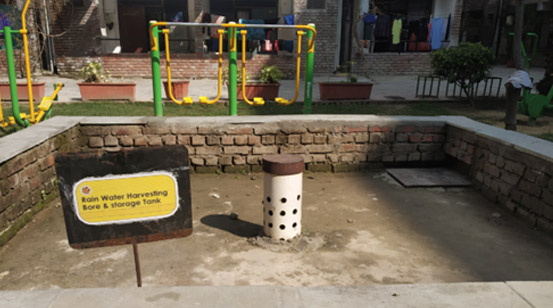
LPU has implemented a comprehensive approach to rainwater harvesting, effectively conserving water resources across the campus. A robust pipeline network captures rainwater from surface runoff, including collection from terraces, and channels it to recharge wells. The campus roads are designed with saucer drain sections to facilitate the collection of rainwater from both the road network and paved walkways. Additionally, the university has established 39 rainwater harvesting bores, or reverse bores, which help replenish the groundwater table—evidenced by a rise of approximately 6 feet as monitored by a piezometer. Efficient watering of plants is enhanced by strategically placed water sprinklers. The rainwater harvesting system also captures runoff from residential building rooftops, directing it through pipelines into recharge wells.
Additionally, a well-designed pipeline network channels rainwater runoff from various surfaces across the campus to recharge wells. This system captures rainwater from terraces and paved walkways, enhancing groundwater replenishment. The harvested rainwater is then directed through pipelines to be utilized for horticultural purposes, supporting LPU’s commitment to sustainable water management practices.
Off Campus Water Conservation
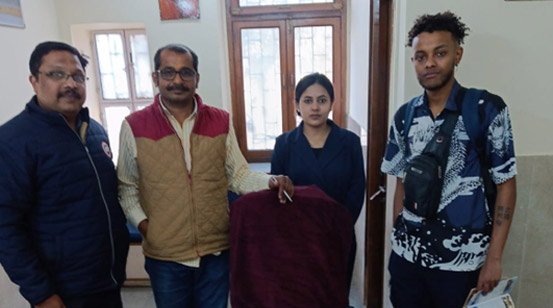
LPU's commitment to off-campus water conservation reflects its comprehensive approach to addressing global water issues, extending its positive impact beyond the university to benefit wider communities and ecosystems. The university’s outreach initiative in Udaipur, Rajasthan, focuses on the proposed expansion of the sewerage system, examining critical elements such as treatment capacity improvements, enhancements to the pipeline network, and planning for future developments. Recognizing the importance of wetlands for sustaining aquatic and terrestrial life, LPU seeks to explore the vital connections between communities and their water resources. Collaborating with various community partners, from small groups to larger organizations, the university fosters regeneration and resilience efforts in local environments.
Click Here
Campus Engagement Activities
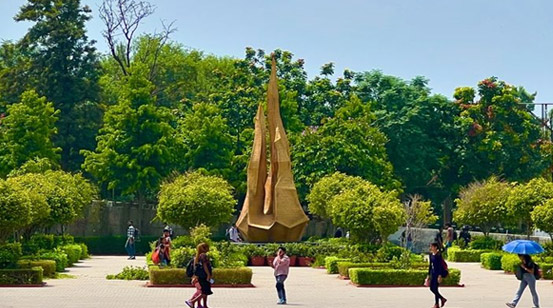
Campus engagement activities at LPU focus on promoting water conservation and sustainability through innovative landscaping practices. The university has adopted xeriscaping, which emphasizes drought-resistant planting that significantly reduces water consumption—up to 75%—and helps prevent topsoil erosion. LPU has implemented smart irrigation systems that optimize watering schedules and volumes based on real-time data from weather forecasts and soil moisture sensors. This technology ensures plants receive adequate water without wastage. Additionally, the university’s agrometeorology observatory enhances these irrigation strategies. A diverse range of drought-tolerant species, such as Date Palm and Gulmohar, has been selected to foster a resilient campus environment. Furthermore, treated water from Sewage Treatment Plants (STPs) is recycled for horticultural purposes, exemplifying effective water reuse and sustainability efforts.
Future Plans for Water Conservation and Clean Water Availability for All
As per the Sustainable Development Goal-6 i.e. Clean water and sanitation, we aim to achieve the following goals by 2029-
- As part of Sustainable Development Goal 6—Clean Water and Sanitation—we aim to achieve the following targets by 2029:
- Water Quality Improvement: Enhance water quality by reducing pollution, eliminating waste dumping, and minimizing the release of hazardous chemicals and materials.
- Water Conservation: Minimize water wastage on campus and implement more water harvesting methods while increasing the capacity of sewage treatment plants (STPs).
- Community Engagement: Foster and strengthen local community participation in water and sanitation management initiatives.
- Ecosystem Restoration: Protect and restore vital water-related ecosystems, including wetlands, rivers, and lakes.
- International Cooperation: Enhance collaboration and capacity-building for developing countries in water and sanitation initiatives.
Conclusion on Ensuring Sustainable Water and Sanitation Access
LPU is dedicated to prioritizing water conservation and management through comprehensive efforts. Recognizing India's status as the second-most populated nation, LPU is aware of the challenges in balancing high water demand with limited resources. The university serves as an inspiring example of effective water and sanitation management, adhering to the guidelines set by regulatory bodies. Amidst economic and environmental challenges, LPU is committed to addressing critical water issues and ensuring equitable access to safe drinking water and sanitation facilities, particularly for women and rural communities.Through the implementation of the Jal Jeevan Mission and Swachh Bharat Abhiyan, LPU has made significant strides in meeting the water and sanitation needs of local communities. The university's regular initiatives benefit underserved populations, and its experiences in achieving Sustainable Development Goal 6 (SDG 6) provide valuable lessons for other nations. LPU aims to expand its efforts in efficient water management, both on-campus and beyond, while fostering collaboration among staff, faculty, and students to ensure a healthier future for all.



